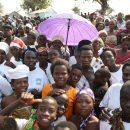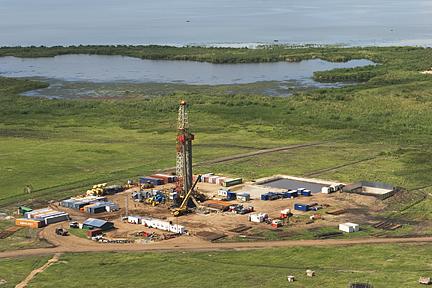Darfur and Compassion Fatigue
Writing in the New York Review of Books recently, Pullitzer winner and Darfur advocate Nicholas Kristof noted that “Darfur fatigue” had set in, and that “the [Save Darfur] movement has lost its steam.”
A close analysis of the frequency with which the media mentions Darfur in recent months suggests he is right about the fatigue. Once the fuss in the media over the application for indictment of Sudan’s president Omar Bashir had died down by September 2008, the rate at which Darfur was mentioned in the press plummeted.
At no other time during the conflict had the frequency with which Darfur is mentioned in the press dropped so low as during the latter half of 2008. There was a spike in media interest in March 2009 as the indictment itself was reported, but frequency has dropped off significantly in the subsequent months.
The interest that maintained Darfur’s place in the media for much of 2004 is long gone. “If it bleeds, it leads,” as the journalist’s aphorism goes – and a lack of blood subdued media interest in Darfur.
Is this an indication that Save Darfur has lost its steam? Any answer to this must firstly take into account what outcome it was reasonable to expect. Other Save Darfur suggested actions, such as “lobbying your member of Congress, educating others, planning a local event” can be evaluated at some other stage.
Darfur may have slipped out of the news, but the low frequency with which it is mentioned in the press need not be particularly remarkable; it can be put down to the usual media cycle in which interest in a subject ebbs and flows, and it can also be put down to the compassion fatigue that has always afflicted public interest in ongoing crises.
There is nothing specific to Darfur that accounts for this fatigue; it is merely a variant of the broader concept of compassion fatigue which afflicts all news stories.
Palestine has long been a cause celebre with a huge and diversified (albeit generally disconnected) advocacy movement, in which Operation Cast Lead was front-page news, whereas the drip-drip of the attritional blockade of Gaza scarcely got a mention.
Simply put, there are so many bad situations and crises in the world that people get bored of repetition; the media ran out of descriptive hyperboles some time ago. One other factor to consider is that in media terms, there is only enough public appetite for one crisis at a time, and thus the media is obliged to undertake a sort of triage when deciding what to cover.
Of course, advocates and activists seek to arrange things such that theirs is the crisis that gets the attention, but there is no predicting (or accountability for) what direction an editor feels inclined to take.
Furthermore, the media are better convinced of something’s (ongoing) newsworthiness by official interest. While the US government declared genocide in 2004, their conviction was not wholehearted; certainly not enough to do anything of substance about it. They were immeasurably distracted by Iraq, and so then were the media.
Today, phrases from US officials such as the “remnants of genocide” will subdue media interest as much as anything, because it suggests there are only remnants of a story.
An interesting aside is that in the absence of much interest by the Western ‘intervening’ governments and the media, it has fallen on celebrities to be the ‘certifiers of disaster,’ a curious twist on the foreign correspondents that would previously stand before a scene of desolation and certify to the world the gravity of the crisis.
In the context of the increasing trend towards the blurring of hard and soft news (‘infotainment’), it is worth noting that Darfur’s attraction to so many celebrities has helped sustain it in the media.
However, notable in the case of Darfur is the unprecedented advocacy movement that has sought to place it as high up the agenda as possible, and to keep it there.
A reflective Kristof asks “did the Darfur movement lose its way? Does it know what it’s doing?” While some may take this as an admission of incompetence, it may equally be understood as a call to clarify its objectives and accept limitations.
In terms of the media, it is inherently difficult to sustain interest over a long period of time, particularly when not much seems to change. In the case of Darfur, things have been changing of course, but the dynamics of the conflict have not been well reflected in its reporting.
The widespread interest in the International Criminal Court involved regular, professional press releases and reporting from press conferences in The Hague, not so much Darfur.
This general area demonstrates a contradiction between the common headline assertion of “ongoing genocide” and Save Darfur’s acknowledgement that the conflict is “very complex and constantly changing” (two factors that in themselves are anathema to media coverage).
The ICC process against Bashir, championed by Save Darfur and covered widely by the media, dropped genocide charges in March 2009, creating a further non-sequitur in an editor’s conception of Darfur. No editor is expected to be an expert on Darfur.
Even prior to this, fairly divergent opinions on death toll figures for Darfur suggested the narrative was not as coherent as other major news stories.
If there was a united and generally coherent position on what has happened in Darfur – in the same way that famines are able to broadly unite observers and advocates on the course of action to take – the cracks now showing in the narrative that have led (among other things) to this hint of introspection would barely be showing.
The dominant themes adopted by the movement – genocide, evil etc – do lend themselves well to media attention, but it is formulaic. Elements of the morality play were prominent (in George Clooney’s words, “it comes down to simply right and wrong”), as was historical analogy: around one in five articles in 2004/05 mentioning Darfur also mentioned Rwanda. One does not explain the other.
If the media notices that attention spans are getting shorter (sadly, a general trend in news consumption), then they will shorten the news, meaning that competition for space becomes fiercer.
Darfur has engendered many creative ways of gaining attention when more conventional methods have struggled, as the Save Darfur dog’s bowl and the ‘Stop Genocide’ thong attest to. However, of course, credibility is a problem: thongs and serious news do not sit well together.
One final observation on generating media coverage is how it is phrased: by “generating coverage in the media about the crisis,” you will “help build the political power needed to end this conflict.”
This sounds a bit unfair: because coverage has been at a low ebb lately, does that mean activists are to blame because they have not tried hard enough to “build the political power needed”? But essentially, here Save Darfur is providing itself with a lifeline – the encouragement and way forward: work harder to generate that media coverage.
Nonetheless, Save Darfur slogans such as “massive response”, “inspiring action” or “speaking truth to power” ring a bit hollow due to their vagueness. On the other hand, the more specific entreaty of “generat[e] media coverage” is hard to do per se, even more so now that the fatigue has properly set in.
In terms of the media, losing steam is a very hard thing to guard against, even before the introspection has begun about how, as Kristof suggests, “we have failed to foster the political will to bring about change.”






